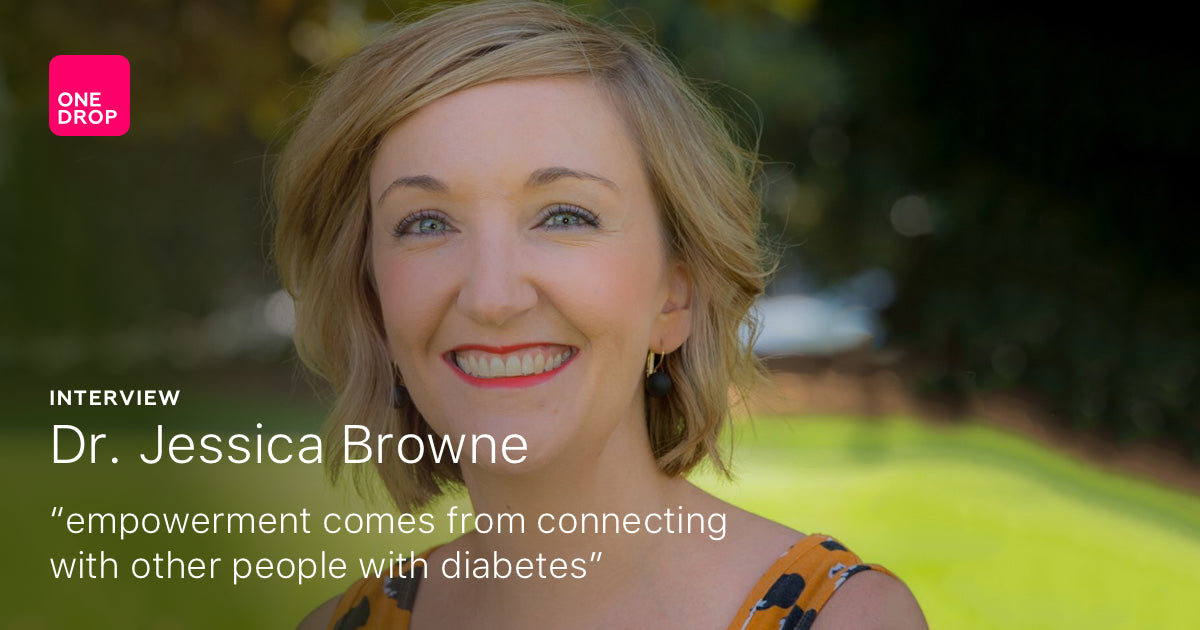Dr. Jessica Browne is a Senior Research Fellow at The Australian Centre for Behavioral Research in Diabetes, and an international expert on the blame, shame, and social stigma affecting people with diabetes. She's interviewed many people with type 1 (T1D) and type 2 diabetes (T2D), and found the majority feel blamed by others for causing their own condition, experience negative stereotyping, are discriminated against or believe they have limited opportunities in life. Psychological distress and concealing one's diagnosis are common consequences, with both having a negative impact on self-care and diabetes management.
At One Drop, we believe having diabetes can be an empowering experience. We want to break down deep-rooted feelings of shame and stigma. To ensure we're doing all we can to help combat this widespread problem, I recently Skype chatted with Dr. Browne about the blame, shame, and stigma affecting people with diabetes, what the diabetes community should be doing to address the problem, and how One Drop can facilitate that agenda.
What causes diabetes blame, shame, and social stigma?
“The drivers vary by people with T1D and T2D. People with T1D talk about feeling somehow lesser if they experience a setback with managing diabetes. For example, if they experience a hypo, they feel like they brought it on themselves and didn't exert enough self control, whereas people with T2D feel blamed by the notion that they brought diabetes on themselves. However, both say the source of the blame, shame, and social stigma they feel and experience is the same: health professionals, the media, and friends and family.”How has the traditional diabetes self-care experience contributed to this?
“Traditionally, what we've done is over emphasized individual responsibility without educating about the complexity of the causes of diabetes and how to manage it. We need to move away from that and towards a nuanced way of communicating about diabetes, so people don't continue to carry that burden.”Is there a difference in the consequences of the blame, shame, and stigma experienced by people w/T1D vs. T2D?
“There's no difference. The psychological impact, which includes psychological distress, diabetes distress, anxiety, and stress looks similar, but this work is still in it's infancy. People with T1D talk about feeling stigmatized by association with T2D, and are quick to differentiate themselves from people with T2D. This is driving a wedge between people with T1D and T2D, making it harder for people w/T2D to get support from people with T1D who are a valuable resource. We see this mirrored in the available online support forums that are geared more towards people with T1D than people with T2D. It's a problem.”How are entities combatting the problem?
“Stigma is a real emerging issue in the diabetes space. As it continues to grow, there will be more attention, more research, and more solutions. People with diabetes need a safe place to hear that having diabetes is not their fault, management setbacks are normal, and where they are not on the receiving end of victim blaming. People with diabetes need to connect to each other, including online forums that are inclusive of all people with diabetes, e.g. ADA online forums, DiaTribe. The key thing is to not create division between people with T1D and T2D, and be a connector in the diabetes community. Doing the opposite reinforces the problem.”How can people with diabetes empower themselves?
“From the people with diabetes I've talked to, empowerment comes from connecting with other people with diabetes and having a safe place to talk about diabetes. I also encourage people with diabetes to stand their ground and talk calmly about how they feel when they are on the receiving end of a healthcare professional or family member who's generating these feelings, and lead by example in the language they use to talk about diabetes. If the workplace is a concern, people can seek advice from an advocacy organization that can explain workplace rights and serve as a mediator between the person with diabetes and the employer. Finally, everyone should use inclusive language when talking about diabetes and push back on the negative media about diabetes, write to the editor, write to the company or organization behind the negative media to create a more positive, collective diabetes voice.”The One Drop solution is all about empowering people with diabetes, and making them feel like a rock star while managing the condition. We do that via our one-of-a-kind app, diabetes coaching service, and kick ass meter. How important are these things for minimizing shame and reducing the consequences of social stigma?
“The One Drop vision is very exciting because it is a voice we don't hear in the diabetes space. It's super important to have an alternative voice like the One Drop voice.”If you could infuse your knowledge into the One Drop user experience, what would that look like?
“The translation is where the rubber hits the road, so this question is really important. The best thing One Drop can do to address this issue is to connect people with diabetes to other people's stories, and give them a voice, be a positive voice that doesn't ignore the challenges of having diabetes, and give people with diabetes the tools to work through and cope with the challenges of having diabetes, so they don't become overwhelmed and feel hopeless. Also, the diabetes stigma work needs to go beyond the individual and feed into to the larger social context in which a person with diabetes is expected to thrive. People with diabetes need to know that fixing this isn't just their responsibility. Diabetes stigma needs to be addressed at multiple levels because it is a huge, widespread barrier to thriving with diabetes.”Any other advice for us?
“One of the key barriers I come against is that people are not always convinced that diabetes stigma is a real thing. We've got a long way to go. I want people to talk about this issue, be a strong voice about this, so that people accept this is a real problem. This is the first step to coming up with meaningful solutions to address it.”




